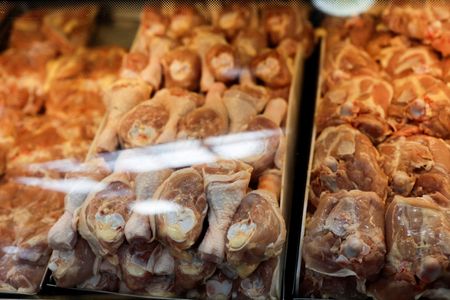By Ana Mano and Roberto Samora
SAO PAULO (Reuters) -Countries, including China, will not accept chicken consignments in transit from Brazil following confirmation of the country’s first bird flu outbreak, Brazilian meat lobby ABPA, which represents large food processors, said on Tuesday.
ABPA president Ricardo Santin told Reuters in an interview that rejection of cargoes may vary according to the date of shipment before outbreak’s confirmation, ranging from 14 to 28 days at the discretion of the destination countries’ official veterinary services.
The situation puts meat processors including BRF SA and JBS SA in a tight spot, as they deal with additional logistics costs and uncertainty related to the extent of ongoing trade embargos triggered by the health emergency.
Brazil accounts for 39% of the global chicken trade, Santin said, citing fresh trade data.
Easing restrictions for cargos in transit is a possibility, Santin said, particularly if the cargo comes from a region far from the outbreak in the town of Montenegro, in Rio Grande do Sul state.
“But that will require negotiations,” Santin said. Mexico and Chile are among countries which would also reject cargoes under existing health protocols related to bird flu outbreaks, he added.
It is not possible to calculate losses stemming from export restrictions in force after confirmation of the first bird flu outbreak on a Brazilian commercial chicken farm, Santin said.
That is because the scope and duration of trade bans may vary according to health protocols and negotiations with importing nations, Santin said.
China, for example, enforced a nationwide ban on Brazil’s chicken imports for about three weeks after a case of Newcastle disease – also found in Rio Grande do Sul – last year, Santin said.
Later, China narrowed the scope of the ban to a statewide restriction that currently remains in place.
Brazil’s government asked China to restrict its bird-flu-related embargo on chicken imports to products just from the town of Montenegro, local media reported on Tuesday.
The agriculture ministry confirmed a request made earlier this month to China to revise existing trade protocols, suggesting implementation of regional rather than countrywide export bans in the event of health emergencies, though denied asking anything specific related to the current bird flu outbreak.
In total, some 20 countries imposed chicken trade bans on Brazil under existing health protocols, the Agriculture Ministry said on Monday. Unlike China, other major importers like Japan, the United Arab Emirates and Saudi Arabia are less strict and enforce regional bans under the existing health emergency protocols.
Santin said it is up to the exporting companies to deal with returned cargoes, adding they also have the possibility of redirecting some consignments.
(Reporting by Ana Mano and Roberto Samora in Sao Paulo; Additional reporting by Lisandra Paraguassu in Brasilia; Editing by Alistair Bell and David Gregorio)









